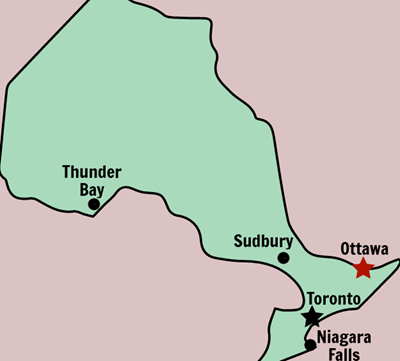Student Activities for Ontario
Essential Questions for Ontario
- What are some significant events in the history of Ontario?
- What are some facts and features that make Ontario unique?
- What are some interesting places in Ontario that people would want to visit?
All About Ontario, Canada
When it joined the Canadian Confederation: July 1st, 1867
Motto: Loyal she began, thus she remains.
Nickname: The province of opportunity.
Bird: Common Loon
Tree: Eastern White Pine
Flower: White Trillium
Attractions: Niagara Falls, Algonquin Park, Stratford Festival, CN Tower, and Parliament Hill.
Famous Citizens of Ontario: Actor Jim Carey, singer Justin Bieber, hockey player Wayne Gretzky, and Director James Cameron.
Capital City: Toronto
Major Cities: Ottawa, Mississauga, Brampton, and Hamilton.
Natural Resources: Trees, water, minerals, corn, wheat, and vegetables.
Brief History of Ontario
Thousands of years ago, early people such as the Algonquians, the Cree, the Iroquois, and the Huron inhabited Canada; they fished and hunted the lands. Many European explorers came to survey the land, and in 1611, they claimed it for England. Over 100 years later, the French, who found alliance in the Huron tribes, and the English, who were allies with the Iroquois, fought over the land in the Seven Years War. The war ended in 1763 with the signing of the “Treaty of Paris” and England emerging victorious. When the American Revolution ended, several British loyalists fled from the United States to Canada, splitting the Quebec colony into Lower Canada (French speaking settlers) and Upper Canada (English speaking province that later became Ontario). On July 1, 1867, the Dominion of Canada was established, which meant it was self-governed, but still within the British Empire; this is when Ontario became a province along with Quebec, Nova Scotia, and New Brunswick. In the late 1800s, mining became very prevalent, and hydroelectric power was on the rise.
Students will create a historical timeline, a postcard, a spider map, and an economy storyboard showing what they have learned about Ontario. Creating these visuals gives the students the opportunity to show their creativity and their unique view of the state that they have researched. In addition, the combined use of words and illustrations allows students with different learning styles to show what they know in an exciting and eye catching way.
How Tos about Canadian Province Research Project
How can I help students compare Ontario with another Canadian province?
Encourage critical thinking by guiding students to research a second province and identify key similarities and differences. This approach helps deepen understanding of regional diversity in Canada.
Select two provinces for comparison.
Choose Ontario and another Canadian province. Let students pick based on interest or assign pairs for balanced exploration. This sparks curiosity and ownership in learning.
Gather facts about each province.
Have students research essential details: capital city, major attractions, history, famous citizens, and natural resources. Use graphic organizers to keep notes organized and easy to reference.
Create a visual comparison chart.
Guide students to design a chart, Venn diagram, or storyboard. Highlight both unique and shared features between the provinces. This visual format supports understanding and presentation skills.
Discuss findings with the class.
Invite students to share their charts and discoveries. Facilitate a discussion about what surprised them or what they found most interesting. Promote respectful listening and collaborative learning.
Frequently Asked Questions about Canadian Province Research Project
What is a Canadian province research project for students?
A Canadian province research project is a classroom activity where students investigate a specific province, learning about its history, geography, culture, landmarks, and important facts. This helps develop research, note-taking, and presentation skills for K–12 learners.
How can teachers make a province research project engaging for K-12 students?
Teachers can make a province research project engaging by including creative activities like timelines, postcards, spider maps, and storyboards. Using visuals and allowing students to choose provinces or topics fosters student interest and active participation.
What are key topics to include when researching Ontario, Canada?
Key topics for researching Ontario include its history, capital and major cities, landmarks, natural resources, motto, nickname, famous citizens, and unique features such as attractions and cultural facts.
What are effective ways for students to present their province research findings?
Effective ways for students to present findings are by creating visual aids like timelines, postcards, spider maps, and economy storyboards. These formats support different learning styles and encourage creativity.
Why is learning about Canadian provinces important in elementary and middle school?
Learning about Canadian provinces is important because it develops geography, history, and research skills while helping students understand Canada’s diversity, culture, and regional differences in an engaging context.
© 2026 - Clever Prototypes, LLC - All rights reserved.
StoryboardThat is a trademark of Clever Prototypes, LLC, and Registered in U.S. Patent and Trademark Office




